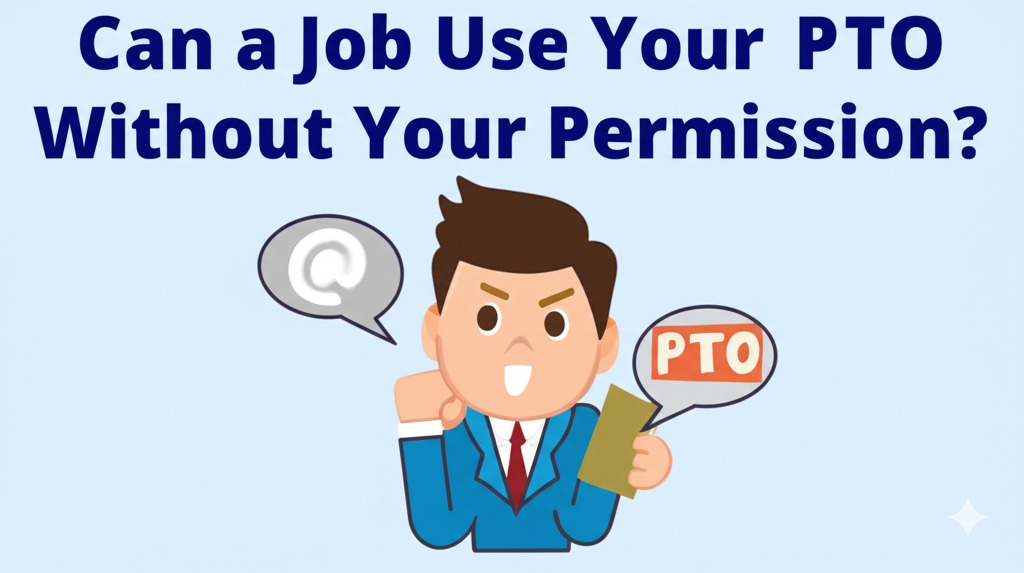
Ever checked your paycheck and noticed PTO hours used that you didn’t authorize? You’re not alone. Paid Time Off (PTO) is something employees earn and often count on for vacation, personal time, or sick days. But what happens when your employer takes the liberty of using it without your consent?
In this article, we’ll explore whether an employer can legally use your PTO without your permission, why it happens, and what you can do about it. Whether you’re an hourly worker, a salaried employee, or somewhere in between, it’s important to know your rights.
What Is PTO and How Does It Work?
Paid Time Off (PTO) is a bank of hours that employees can use for vacation, personal leave, or illness. It’s a benefit many employers offer as part of a compensation package.
Common PTO Policies
- Accrued PTO: Earned gradually over time.
- Frontloaded PTO: A lump sum is provided at the beginning of the year.
- Use-It-or-Lose-It: Must be used within a specific timeframe or forfeited.
- Unlimited PTO: Employees can take time off as needed, within reason.
Understanding your company’s specific policy is crucial—it often outlines when and how PTO can be used.
Can an Employer Use Your PTO Without Your Consent?
The Short Answer: Sometimes—But It Depends
Yes, in certain situations, an employer can use your PTO without your permission, but the legality and ethics of doing so depend on:
- State labor laws
- Your employment contract
- Company policy
Let’s break it down.
Situations Where Employers Might Use PTO Without Asking
1. During Mandatory Closures
If a business temporarily shuts down (e.g., for holidays, slow periods, or emergencies), some employers may automatically deduct PTO to keep you paid instead of going unpaid.
2. To Cover Tardiness or Early Departures
Employers might deduct PTO hours if you arrive late or leave early—especially if your timecard reflects reduced hours.
3. To Meet Full-Time Hour Requirements
For salaried employees, some companies use PTO to “top off” hours during a light workload week, maintaining full-time status for benefit eligibility.
4. Policy-Driven Usage
If your employer’s policy states they may apply PTO under specific circumstances (and you signed off on it), it’s often enforceable.
Tip: Always read and understand your company’s PTO and attendance policy thoroughly.
Is It Legal for Employers to Force PTO Use?
Varies by State and Employment Agreement
Some states like California have strict rules around PTO use, while others offer more flexibility to employers. Here’s a general guide:
- At-Will States: Employers may have broad discretion, especially if outlined in the policy handbook.
- States with Worker Protections: Places like California and Massachusetts often require explicit employee consent or provide recourse.
- Union or Contract Employees: If covered by a collective bargaining agreement or contract, the employer must follow its terms.
Bottom line: If PTO usage without permission is not addressed in your contract or policy, you may have a case.
What Can You Do If PTO Is Used Without Your Consent?
1. Review Your Employee Handbook
Check the written policy on PTO usage. If it’s vague or unclear, that could work in your favor.
2. Communicate With HR
Politely ask for an explanation in writing. If it’s a misunderstanding, it may be reversible.
3. Track Your Time
Keep records of your hours worked and PTO used. This can help you dispute discrepancies.
4. Know Your State Laws
Labor laws vary by state. For example:
- In California, forced PTO use may violate labor codes.
- In Texas, employers have more freedom to manage PTO as they see fit.
5. Seek Legal Advice
If you’re not satisfied with your employer’s response, consider talking to a labor attorney or your state labor board.
How to Protect Your PTO in the Future
- Request time off in writing and keep a copy.
- Monitor your pay stubs for PTO deductions.
- Understand your PTO balance and how it’s calculated.
- Keep an open line of communication with your manager and HR.
Being proactive can prevent unwanted surprises.
Final Thoughts: Know Your Rights and Stay Informed
So, can a job use your PTO without your permission? Unfortunately, in some cases, yes—but it depends on your location, contract, and company policy.
The key takeaway is this: knowledge is power. Understand your rights, stay informed about your employer’s policy, and don’t be afraid to ask questions.

Andre Cuevas provides career insights, job search strategies, and professional advice to help individuals navigate the job market and achieve their career goals.






